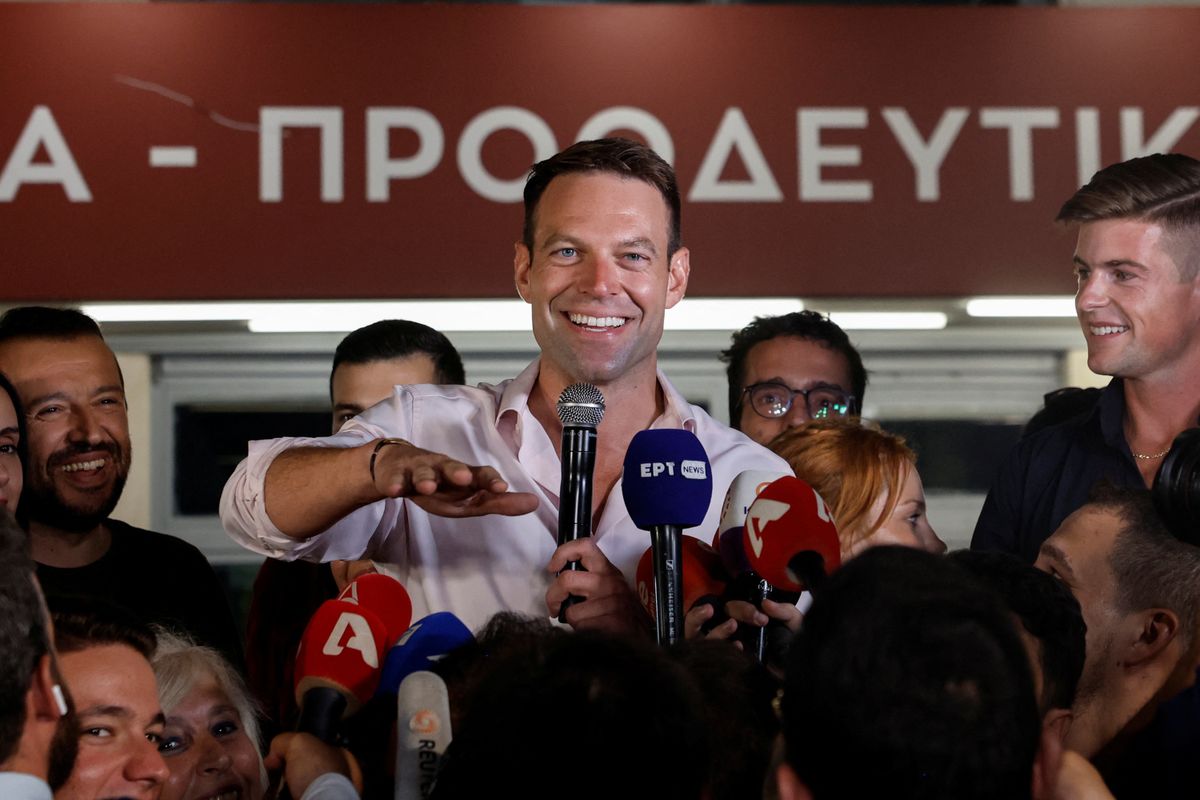Stefanos Kasselakis, a Miami-based former investment banker and shipping magnate, is taking the helm of Greece’s left-wing Syriza Party, which was left bloodied by June’s general election.
The crushing defeat – the party won less than a quarter of the national vote – led to Alexis Tsipras’s resignation as leader.
On Sunday, Kasselakis won 56% of the party’s vote to succeed Tsipras as leader. His unlikely victory in the historically communist and anti-fascist party’s leadership election comes amid a booming economy that contrasts sharply with the austerity Greeks faced under Syriza’s last government.
Who is Kasselakis? Until recently, he was a no-name in Greek politics — and he didn’t even live in Greece full-time. As a youth, he earned a scholarship to the prestigious Philips Academy in Massachusetts and completed his undergraduate studies at the University of Pennsylvania.
He took a job at Goldman Sachs after graduating but soon founded his own shipping company. Kasselakis reportedly earned a reputation for dealing well with distressed assets after successfully selling off five of the company’s ships in 2022.
But his political resume is thin: He debuted as an at-large candidate for Syriza in the June elections (expatriates are allowed to run), but he didn’t even win the seat.
Then, late last month, he released a campaign video explaining his life and arguing he was the right man to defeat sitting Prime Minister Kyriakos Mitsotakis. The handsome, young, openly gay Kasselakis said he had seen first-hand capitalists “buying cheaply other people’s labor” and how “arrogance makes money.”
The video took off, and buoyed by its success, Kasselakis sprang into action, visiting the areas most severely affected by recent wildfires and floods to criticize the government’s response. He also visited an Aegean island where thousands of Greek communists were imprisoned after the country’s civil war, underlining his sympathies to Syriza’s left wing.
Just 19 days after publishing the video, he beat leading establishment candidate Eftychia "Effie" Achtsioglou in the first round of the leadership contest by 9 percentage points.
A new Syriza? Kasselakis’s overtures to Syriza’s historical leftism notwithstanding, the party ideology might be just that: historical. Prof. Michael Rossi, who teaches modern Greek politics at Rutgers University, says Kasselakis’s ascension is a sign that Syriza is moderating its left-wing populism to survive.
The ruling center-right New Democracy Party took a comfortable lead in the June elections, energized by Greece’s strong economy. It’s a sharp contrast with the austerity measures Greece was forced to adopt during Syriza’s only term in government from 2015-2019. They came to power after the collapse of the traditional center-left party PASOK, which had been left holding the bag after the global financial crisis triggered a Greek sovereign debt crisis in 2009.
“A vote for Syriza in the past was a vote against New Democracy, against PASOK, against the European Central Bank. And then once they get into power, they realize that they can't do much without long-term cooperation with other parties,” says Rossi. “How we get the Goldman Sachs guy speaking on their behalf is very simple: Syriza is now filling in the gaps of what PASOK once was.”
But unseating New Democracy will be challenging. The Greek economy is growing at twice the eurozone average, and unemployment is at the lowest level in a decade. The Mitsotakis government has cut taxes and raised the minimum wage while simultaneously reducing debt so that the country is currently ahead of schedule in paying back its bailout loans. A strong record to carry into elections no matter how you slice it.
That said, there is a lot of debt to be repaid — 166% of GDP, to be precise. And while unemployment may be lower, 11% is no walk in the park. Neither is persistent inflation amid rising food and energy costs as nearly one in five Greeks lives below the national poverty line.
This may open a window for Syriza under Kasselakis to build a base among those who still feel left behind in preparation for the next election no later than 2027 – though Rossi says it is unlikely to be large enough to totally unseat the incumbents. Instead, he says, a larger Syriza minority in parliament could limit New Democracy’s coalition options, or even spark a grand left-right coalition.
“Is it possible at some point in the future that a former Goldman Sachs head of Syriza could work with New Democracy?” he asks, answering with: “Hey, this is Europe.”






